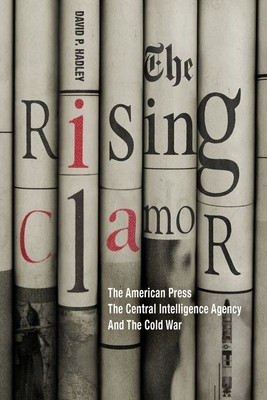
- We will send in 10–14 business days.
- Author: David P Hadley
- Publisher: University Press of Kentucky
- ISBN-10: 0813177375
- ISBN-13: 9780813177373
- Format: 15.5 x 23.1 x 2.3 cm, hardcover
- Language: English
- SAVE -10% with code: EXTRA
Reviews
Description
The US intelligence community as it currently exists has been deeply influenced by the press. Although considered a vital overseer of intelligence activity, the press and its validity is often questioned, even by the current presidential administration. But dating back to its creation in 1947, the US Central Intelligence Agency (CIA) has benefited from relationships with members of the US press to garner public support for its activities, defend itself from its failures, and promote US interests around the world. Many reporters, editors, and publishers were willing and even eager to work with the agency, especially at the height of the Cold War.
That relationship began to change by the 1960s when the press began to challenge the CIA and expose many of its questionable activities. Respected publications went from studiously ignoring the CIA's activities to reporting on the Bay of Pigs, CIA pacification programs in Vietnam, the CIA's war in Laos, and its efforts to use US student groups and a variety of other non-government organizations as Cold War tools. This reporting prompted the first major congressional investigation of the CIA in December 1974.
In The Rising Clamor: The American Press, the Central Intelligence Agency, and the Cold War, David P. Hadley explores the relationships that developed between the CIA and the press, its evolution over time, and its practical impact from the creation of the CIA to the first major congressional investigations of its activities in 1975-76 by the Church and Pike committees. Drawing on a combination of archival research, declassified documents, and more than 2,000 news articles, Hadley provides a balanced and considered account of the different actors in the press and CIA relationships, how their collaboration helped define public expectations of what role intelligence should play in the US government, and what an intelligence agency should be able to do.
EXTRA 10 % discount with code: EXTRA
The promotion ends in 18d.23:11:25
The discount code is valid when purchasing from 10 €. Discounts do not stack.
- Author: David P Hadley
- Publisher: University Press of Kentucky
- ISBN-10: 0813177375
- ISBN-13: 9780813177373
- Format: 15.5 x 23.1 x 2.3 cm, hardcover
- Language: English English
The US intelligence community as it currently exists has been deeply influenced by the press. Although considered a vital overseer of intelligence activity, the press and its validity is often questioned, even by the current presidential administration. But dating back to its creation in 1947, the US Central Intelligence Agency (CIA) has benefited from relationships with members of the US press to garner public support for its activities, defend itself from its failures, and promote US interests around the world. Many reporters, editors, and publishers were willing and even eager to work with the agency, especially at the height of the Cold War.
That relationship began to change by the 1960s when the press began to challenge the CIA and expose many of its questionable activities. Respected publications went from studiously ignoring the CIA's activities to reporting on the Bay of Pigs, CIA pacification programs in Vietnam, the CIA's war in Laos, and its efforts to use US student groups and a variety of other non-government organizations as Cold War tools. This reporting prompted the first major congressional investigation of the CIA in December 1974.
In The Rising Clamor: The American Press, the Central Intelligence Agency, and the Cold War, David P. Hadley explores the relationships that developed between the CIA and the press, its evolution over time, and its practical impact from the creation of the CIA to the first major congressional investigations of its activities in 1975-76 by the Church and Pike committees. Drawing on a combination of archival research, declassified documents, and more than 2,000 news articles, Hadley provides a balanced and considered account of the different actors in the press and CIA relationships, how their collaboration helped define public expectations of what role intelligence should play in the US government, and what an intelligence agency should be able to do.


Reviews